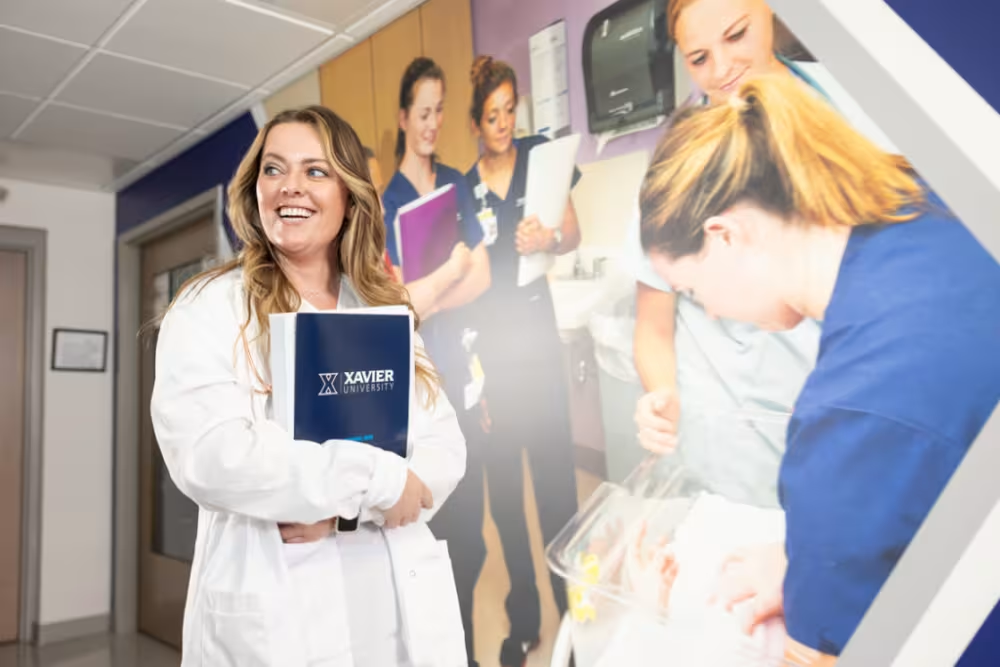Second-Degree Nursing Programs: The Best Path for Career Changers
Each blog post is dated and contains accurate information as of that date. Certain information may have changed since the blog post publication date. If you would like to confirm the current accuracy of blog information, please visit our ABSN program overview page or contact us at 866-890-9467.
You can pursue nursing as a second degree with Xavier University’s Accelerated Bachelor of Science in Nursing Program. Our second-degree nursing program requires only four prerequisite courses and fewer admission requirements than other ABSN programs. It’s an accelerated pathway toward a nursing career that offers personalized support from admissions advisers.

A career change and a desire to be part of something bigger than yourself are admirable to strive for. As nursing is one of the most rewarding, high-demand occupations, pursuing nursing as a second career can be appealing. Making a career change can be daunting, however. Going back to college for another four years can be a little overwhelming. Second-degree nursing programs, however, are far more feasible and don’t take nearly as long.
Xavier University’s Accelerated Bachelor of Science in Nursing (ABSN) program makes earning a quality BSN degree possible in as few as 16 months. This program doesn’t require you to start your college education from scratch. Our ABSN program builds on your non-nursing bachelor’s degree so you can begin professional nursing study from the first day.
With a nursing career within reach, you’ll want to learn more about the ABSN model and what you can expect. Consider the benefits of pursuing nursing as a second career, research the requirements and decide if a 2nd degree BSN program is right for you.
What Is a Second-Degree Nursing Program?
A 2nd degree BSN program is an undergraduate program that confers a Bachelor of Science in Nursing degree. Graduates are eligible to sit for the NCLEX-RN® licensure exam. This program is designed specifically for students who have already earned a Bachelor of Arts or a Bachelor of Science degree in a field other than nursing. At Xavier, our ABSN program can allow you to graduate in as few as 16 months after completing any needed prerequisite courses.
An ABSN program provides an accelerated pathway toward pursuing a nursing career. It works by eliminating or reducing the general education requirements, focusing instead on nursing education. ABSN programs also offer compressed scheduling, with classes, labs and clinicals scheduled over consecutive semesters without a summer break in between. As a result, you can graduate more quickly and pursue nursing licensure.

What Is the Fastest Way to Become an RN?
There are multiple ways to become an RN. One is to enroll in a traditional BSN program, which takes four years and is designed for individuals with little to no college education.
A second pathway is an Associate Degree in Nursing (ADN), which typically takes two years. An ADN is a lesser credential than a BSN, as it does not allow for potential career advancement.
Thirdly, you could apply to Xavier’s ABSN program. After completing the prerequisites, you could graduate in as few as 16 months, less time than a two-year ADN program. The fastest way to become an RN is through an ABSN program.
How to Become a Nurse Through a Second-Degree Nursing Program
What is a second-degree nursing program like, and how can you start? It starts with navigating the admissions process with the help of Xavier’s dedicated admissions advisers.

Complete Prerequisites
Like other ABSN programs, Xavier requires the completion of specific prerequisites to ensure our applicants have the proper academic foundation for success in nursing school. Compared to other ABSN programs, however, Xavier has far fewer prerequisites. You’ll only need to complete four of them. Note that your prior college education may fulfill some or all of the requirements.
Someone with a liberal arts degree will likely have to complete all four of our ABSN prerequisites: microbiology, anatomy and physiology I and II and statistics. Nurses need a strong understanding of math and science to be successful.
Our ABSN prerequisites are challenging, so if you’ve struggled with science, consider taking these courses individually. You don’t want to stretch yourself too thin when trying to navigate the complexities of the material.
When you’re ready to take these prerequisites, we make it convenient for you by offering them 100% online through our university. When you choose Xavier to complete the prerequisites, you may qualify for provisional admission into the ABSN program.
Many of our ABSN program applicants have a biology degree. If that’s your background, you’ve probably completed most, if not all, of our ABSN prerequisites. Having already completed these prerequisites, you can complete the admissions process and enter nursing school more quickly.
However, you must show successful completion of these courses within eight years of entering our ABSN program. Why? Science is constantly evolving, with researchers making discoveries all the time. Your science knowledge needs to be up to speed so you can grasp today’s complex nursing concepts.
Apply to and Graduate From the Program
After completing the prerequisites, you can submit your application. Xavier reviews applications on a rolling basis, which means applicants typically receive a decision within just a few weeks.
If accepted to our ABSN program, you’ll benefit from a hybrid learning approach. You’ll complete coursework online and visit one of our ABSN learning centers located in Columbus or Cleveland, Ohio, for in-person nursing labs. You’ll also complete clinical rotations at nearby healthcare facilities to gain experience caring for patients.
All three components work hand-in-hand and offer a sequential approach to nursing education. As your coursework gets more advanced, you’ll learn more advanced nursing skills in your labs and get more involved in clinical rotations.

Discover what you can expect during your first semester of nursing school when you join our ABSN program.
Become a Licensed Nurse
After earning your nursing degree, the next step is to take the NCLEX. This licensure exam tests your nursing knowledge and ability to apply critical thinking skills and nursing processes to various patient care scenarios. Our academic success coaches at Xavier can help you learn innovative strategies to prepare for the NCLEX. We also offer NCLEX prep resources. Once you pass the NCLEX, you can obtain your state-issued nursing license and apply for RN jobs.
Benefits of Pursuing Nursing as a Second Career
Why pursue nursing as a second career? There’s a lot to love about the nursing field, including the following:
- A diverse range of specialization options
- Many different work settings to choose from
- Opportunities for career advancement
- Meaningful, well-respected career
- Strong earning potential and robust job growth rate
In addition, career switchers are likely to find that many of their soft skills transfer well to nursing.
Is a 2nd Degree BSN Program Right for You?
Our second-degree nursing program could be right if you have a non-nursing bachelor’s degree and the drive necessary to become an RN. Our ABSN cohorts welcome a diverse range of students from all backgrounds. Many career changers apply to our ABSN program, from realtors to sales representatives to psychologists and everything in between.
Xavier has helped students 30 years into their previous career make a career change to pursue nursing as a second degree, for example. Our ABSN cohorts represent a unique mix of students from different academic backgrounds. If countless ABSN students have succeeded already, then you can, too.
Eager to get started working toward a nursing career? Learn how to get into nursing school, with tips to improve your chances.

Get Started With Your Nursing Career at Xavier
Xavier’s two ABSN learning centers in Ohio, in Cleveland and Columbus, provide an accelerated pathway toward a nursing career. With a curriculum infused with Jesuit values and extensive student support resources, including academic success coaches, our ABSN program is an excellent choice for future nurses.
Contact our admissions advisers today to get started.

ABSN 101 Guide
Download our ABSN 101 Guide to help you successfully navigate the accelerated path to nursing.
